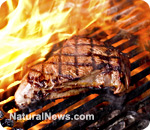(NaturalNews) Red meats have long been associated with an increased risk of cancer- specifically colorectal, breast and prostate cancer. There has been little conclusive evidence definitively indicating red meats play a role in endometrial cancer (a.k.a. cancer of the uterus). There is no known cause of this disease. It affects women as early as 40 years old, but most often occurs for women between the ages of 60 and 70. It is likely that levels of hormones (estrogen) play a large role, but the influence of nutrition is somewhat convoluted. A study followed the consumption of meats, endometrial cancer development and overall health in 60,000 Swedish women from 1987 to 2008.
The science behind it
Animal protein is composed of both heme and non heme iron. The heme iron found within the animal proteins creates the issue, as it is inflammatory. Fruits and vegetables are proven antioxidants, where as heme iron is thought to be pro-inflammatory. The heme iron found in red meats creates more oxidative stress within the body and leads to DNA damage. Additionally, heme iron has been linked to the development of both diabetes and obesity. These two conditions predispose an individual to the development of endometrial cancer.What did the study find?
The study's participants had an initial physical to screen their baseline health and rule out those who were not qualified for participation. The women filled out surveys on a quarterly basis that assessed the types of meat they were eating (poultry, red meat, fish, and processed meat), their overall health, and development of disease. There was a 20 to 30 percent increased risk of endometrial cancer for participants who had the highest heme iron and total dietary iron intake as compared to those participants who had the lowest values. When the data was compared for a specific meat, i.e. chicken vs. beef, liver products were found to have a 30 percent higher risk of endometrial cancer. Liver has a higher portion of heme iron. No other meat types were correlated with an increased risk of developing endometrial cancer. The study also found that an increased rate of total dietary iron and heme iron were associated with higher incidence of endometrial cancer over the 21-year period. Additionally, those study participants with a higher BMI (body mass index) and a greater meat intake, had a greater risk for developing endometrial cancer. Another study looked at the consumption of iron containing meats, but not heme iron, and its associated risk with endometrial cancer. There was a two-fold risk in development if the disease associated with increased intake.Many of the red meats become harmful in the way they are prepared. The ingredients in processed meats have been shown to have high levels of heme and total iron. These have been shown to be carcinogenic. This was not studied in this group of Swedish women and cannot be compared.
Food for thought
• Iron levels should always be assessed by a qualified practitioner• There is a causal link indicating increased heme iron containing meats like liver, increase the risk for endometrial cancer
• Try incorporating complete plant proteins into your diet such as quinoa

No comments:
Post a Comment